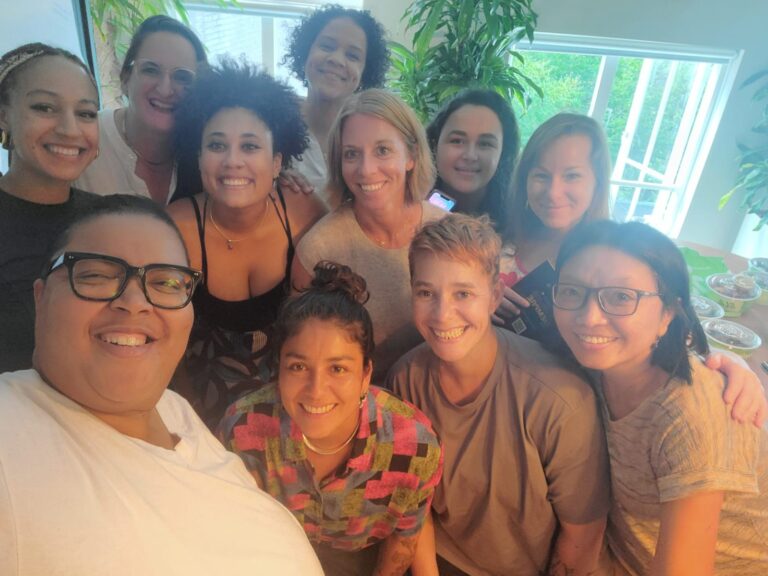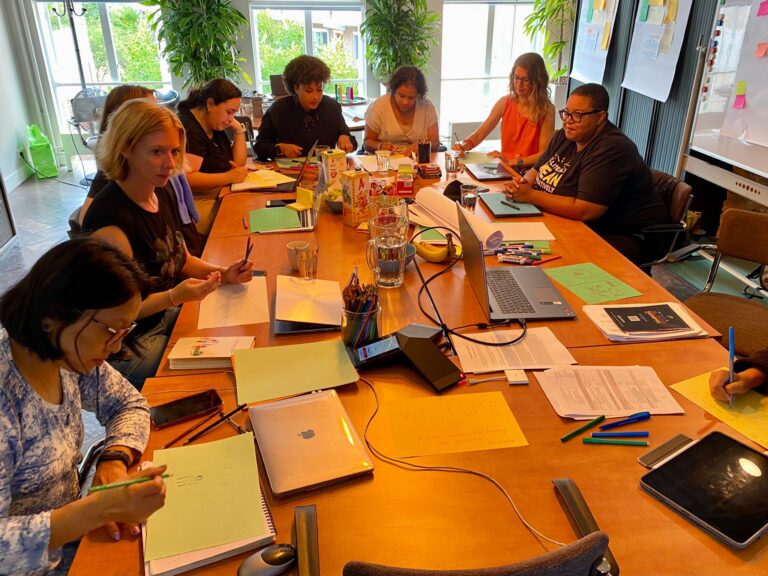Astraea Lesbian Foundation for Justice and the International Indigenous Women’s Forum’s (FIMI) AYNI Fund and Women Win recognize the inherited colonial and financial practices in the philanthropic sector that perpetuate disparities and oppressions. They decided to flip the paradigm on what it means to create change. This resulted in focusing on internalizing intersectional feminism and decolonization within their organizational structures, processes, operations, grantmaking, advocacy, and other activities.
“We recognize that the systems that oppress our constituencies will not be abolished if we continue to work with the same tools that these systems have created. This collaborative seeks first to enable each women’s fund to find ways to articulate what these values mean to each of us and, second, to create communities of practice where we can try new things together, challenge each other, learn from each other, and iterate based on our experiences, while we operationalize these new ways of doing and working within our individual women’s fund”.
Inspiration
Systems of extraction, exploitation, and colonialism have historically oppressed LGBTIQ+, Indigenous Women, and young women and girls. The collaboration aims to improve the visibility of these groups by enhancing the capacity of the three women’s funds to embody a vision of a more equal and just world. This involves aligning internal policies, practices, grantmaking operations, MEL, staffing decisions, and more to better serve and advocate for these populations.
This approach to intersectionality involves unpacking the core values, sectors, and target groups the three women’s funds work with and understanding how they intersect. This feminist and decolonized approach to philanthropy celebrates diversity and commits to understanding the contexts in which they work. The group will adopt a decolonization framework to reimagine resource redistribution and transform power relations.
The Process
The collaborative will focus on three areas:
- People, Culture, and Operations: Share HR practices and frameworks, identify current hurdles, and co-create transparent policies and practices.
- Movement Building and Grantmaking: Examine current grantmaking approaches, support capacity building, and explore ways to support unregistered groups. Refine grantmaking operations and processes.
- Organizational Knowledge Building and Management: Engage in a shared process of knowledge building and sharing. Create a final document capturing key learnings.
Ways of Working
- Astraea, FIMI, and Women Win use a shared-governance process for collaborative decision-making, allowing time for internal reflection and validation in cross-fund Steering Committee meetings.
- The FOEC Steering Committee, with two members from each fund, meets monthly to oversee the collaboration, set priorities, and define policies and practices.
- Key staff and the coordinator will convene in-person at the project’s start to establish logistics and principles and at the end to review progress.
- The collaborative also operates through an online learning circle with monthly meetings for shared, self-directed learning, peer model sharing, and expert input on practices and refinements.
- The decision-making process incorporates individual funds’ perspectives, ensuring shared final decisions.
- Collaborators are committed to avoiding added strain on staff. The project’s scope is limited to ensure it is well-resourced and aligns with their values, focusing on fewer activities with more attention and resources.
- The FOEC balances individual and collaborative activities in its budgets. Each fund manages its own budget for individual activities, while one fund manages the collaborative activities, with decisions made in Steering Committee meetings.
What Does Success Look Like?
- Deepened understanding and trust among collaborators.
- Shared understanding of decolonization and intersectional feminist principles in practice.
- Concrete actions to define organizational knowledge building and management processes.
- Meaningful engagement, managing tensions, and solving conflicts collectively.
- Shared reflections and discussions with the broader ecosystem, donors, stakeholders, and partners.
Between the lines
Astraea, FIMI, and Women Win understand that each fund is part of different and interconnected movements with different entry points and constituents. They have come together because of shared politics and values and are just beginning to explore these synergies and how their perspectives connect. Their goal is to clearly articulate their values and synergies through the collaboration.
As women’s funds working to change the realities of their key constituencies and dismantle oppressive systems — colonization, imperialism, patriarchy, heterosexism, and capitalism– they know they must try new ways of operating that challenge these systems.
Each fund will start by mapping current activities and establishing a baseline for measuring change. At the end of the initiative, they will reflect on any shifts made since the baseline. The FOEC plans to continue this work even after the grant period, aiming for a second assessment once changes have been institutionalized.


